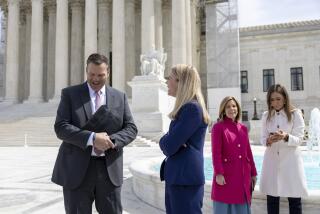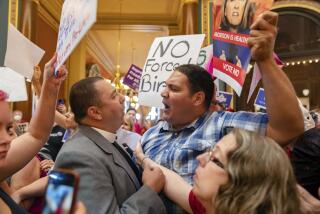Abortion Issue Splits Court, 4-4 : Deadlock Affirms Voiding of Curbs on Teen-Agers’ Rights
- Share via
WASHINGTON — The Supreme Court, in a 4-4 deadlock, affirmed a lower court order Monday striking down an Illinois law limiting a teen-ager’s right to an abortion.
The deadlock, which underscored the pivotal role that will be played by the justice who fills the court’s vacant ninth seat, occurred as the Senate Judiciary Committee began confirmation hearings for Anthony M. Kennedy, President Reagan’s latest nomination to the court.
Kennedy has no public record on the abortion issue as a federal appeals court judge in Sacramento, Calif. In testimony Monday, Kennedy said he believes that the Constitution created a right to privacy for individuals--the basis of previous Supreme Court rulings in favor of abortion--but he did not say whether he believes that this protects a woman’s right to an abortion.
Parental Consultation
The Illinois law, which required doctors to give both parents 24 hours to consult with daughters under 18 before an abortion could be performed, had been struck down by a federal appeals court.
Although the Supreme Court’s 4-4 split left that ruling intact, it set no national precedent.
Twenty-one other states, including California, have laws that require parents to be notified or to give their consent before their minor daughters have an abortion. Because many of those statutes are being challenged in court, the Supreme Court almost surely will be forced to consider the question again.
After first ruling in 1973 that women have a constitutional right to an abortion, the Supreme Court has wavered on whether teen-age girls have the same right. In a series of divided rulings, the court has said that states may require a role for parents, as long as those requirements do not block or “unduly burden” a girl’s decision to end her pregnancy.
Continuing Battleground
The abortion rulings affecting teen-agers have been clouded and the votes extremely close, and legal experts say that the issue will be a battleground in the Supreme Court over the next few years.
The recent appeals to the Supreme Court on abortion have not dealt with direct efforts to overrule the 1973 ruling but rather with state laws seeking to regulate physicians and clinics providing abortions.
The Illinois Legislature in 1983 declared that doctors must give parents time for “meaningful consultation” with daughters who seek abortions.
Anti-abortion activists said that the measure would promote family decision-making and avoid hasty decisions that would be regretted later. Abortion rights advocates said that the law was merely an attempt to make it more difficult for girls from troubled and divided homes to get an abortion.
Before the Illinois law could go into effect, the ACLU obtained a federal court order striking it down as an undue burden on teen-agers’ right to get an abortion. In 1985, the U.S. 7th Circuit Court of Appeals upheld this conclusion on a 2-1 vote.
One-Sentence Statement
The Supreme Court heard arguments in the case (Hartigan vs. Zbaraz, 85-673) on Nov. 2. After discussing the case for several weeks, the justices Monday issued a one-sentence statement: “The judgment below is affirmed by an equally divided court.”
The split decision represents a tactical victory for the ACLU lawyers. It not only preserves their victory in the lower courts but it disposes of a case that was not an entirely favorable one for them because it did not involve an instance in which the law had damaged teen-agers who sought abortions.
“We are pleased with the decision,” said Colleen Connell, an ACLU attorney from Chicago. “Actually, we’re pleased with any victory we can get. It means that our doctors and teen-agers are safe, at least for now.”
The executive director of Americans United for Life, the anti-abortion group that drafted the Illinois law, said he was disappointed.
“This leaves intact a ruling that deprives parents of the right to even know about an abortion,” said Edward Grant, who is also the group’s general counsel. “This is the mildest form of regulation, and it wasn’t allowed. On the plus side, this decision has no value as precedent, and there are a lot of other cases in the pipeline.”
Minnesota Case Pending
The high court gets its next chance to consider the issue in a case from Minnesota. Like the failed Illinois law, a Minnesota statute gives teen-age girls the option of seeking a state judge’s approval for their abortion if they find it impossible to tell their parents.
A federal judge struck down the Minnesota law last year after hearing testimony from girls from rural areas or troubled homes who said that the law effectively prevented them from getting a safe, early abortion. In September, a three-judge appeals court panel upheld this judgment. Unless the full appeals court reverses this decision, state officials say, they will appeal to the Supreme Court.
California’s new law, to go into effect on Jan. 1, requires parents to give their consent before a minor daughter has an abortion.
The high court action in the Illinois case “bears no impact” on the California law, said Janet Carroll, an anti-abortion activist in Sacramento.
However, attorneys for the ACLU and Planned Parenthood have asked a state court in San Francisco to block the law before it takes effect. A hearing has been scheduled for next Monday.
Second Issue Left Undecided
Monday’s split decision is the second time this fall in which the eight-member high court was unable to decide a crucial legal question. In October, the court said it was split on whether the federal government could refuse to issue visitor’s visas to foreign political activists merely because of their ties to leftist groups. The 4-4 vote in that case let stand a lower court ruling that the government must supply more evidence of the national security threat posed by the visitors before it may deny them visas.
In other actions Monday, the court:
--Made it more difficult for coal miners to obtain benefits for black lung disease. On a 6-2 vote, the court concluded that former miners must prove that they have at least one symptom of the disease before getting benefits. Miners said that “one item of evidence,” not proof, should be sufficent (Mullins vs. Office of Workers’ Compensation Programs, 86-327).
--Refused to hear a challenge to an “open view” ordinance in Rolling Hills Estates, Calif. A couple who had been refused permission under a zoning law to add a second story to their home contended that the law was unconstitutional. But the justices said that the case (Ross vs. Rolling Hills Estates, 87-658) did not present a “properly presented federal question.”
More to Read
Sign up for Essential California
The most important California stories and recommendations in your inbox every morning.
You may occasionally receive promotional content from the Los Angeles Times.














